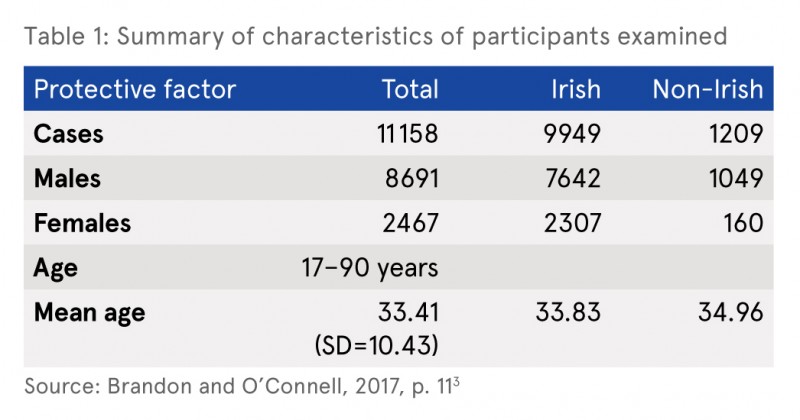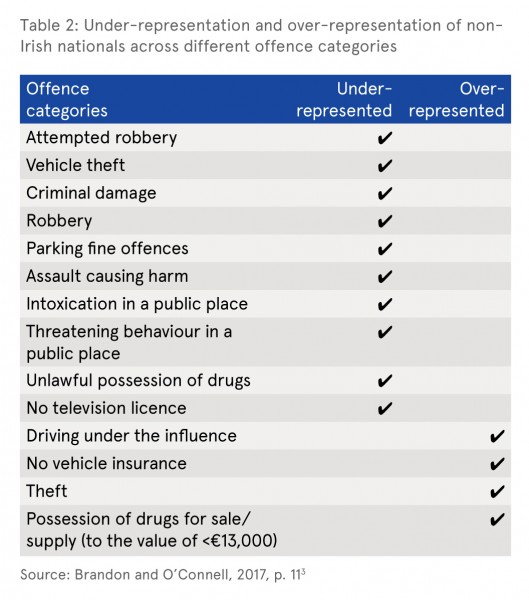Guiney, Ciara (2018) Same crime: different punishment? Sentencing disparities between Irish and non-Irish nationals. Drugnet Ireland, Issue 66, Summer 2018, pp. 8-9.
| Preview | Title | Contact |
|---|---|---|
|
PDF (Drugnet 66)
1MB |
A central view of justice in democratic societies is that people are regarded equally and respectfully and are not exposed to discrimination, directly or indirectly (p. 1).1 An area of concern worldwide is the occurrence of discrimination centred on ethnic, cultural or social groups within the criminal justice system.2 Historically, Ireland has been associated with ‘mass emigration’ (p. 1).3 However, since the nineties and noughties, due to the economic downturn, this trend has been reversed and Ireland has become a multicultural society that is now home to many EU citizens.3 The change in Ireland’s population has similarly been reflected within the Irish criminal justice system. Hence, the study described here by Brandon and O’Connell is timely and aimed at determining whether racial bias was present in Irish sentencing practices between Irish and non-Irish nationals.4
Based on the findings of the literature review, attention was paid specifically to offences that involved theft and robbery and those that were subject to ethnic profiling, such as motoring and drug offences. The research question that was addressed was: Are non-Irish nationals receiving harsher sentences than Irish nationals for the same offence?
Methods
The data, which was collated by the Irish Prison Service, covered a 12-month period between 2015 and 2017. Table 1 shows the prevailing characteristics of the prison population under examination. The final dataset comprised 35 offence categories.

Results Non-Irish national representation
Across all offence categories, 10.84% of committals were non-Irish nationals. As shown in Table 2, cross-tabulation analyses indicated that although non-Irish nationals were under-represented in a range of offences, they were over-represented in four offence categories: driving under the influence; having no vehicle insurance; theft; and possession of drugs for sale or supply to the value of <€13,000.
Nationality bias in sentencing
Independent t-tests were applied to determine whether mean sentence length received by non-Irish nationals differed from sentences received by Irish nationals. The results showed that Irish nationals received significantly longer sentences for assault and no road tax. Non-Irish nationals received significantly longer sentences for estreatment of bail, using a vehicle without an NCT certificate, and failure to comply with a Garda.
Regarding offences for possession of drugs for sale or supply to the value of <€13,000, although non-Irish nationals received sentences 10.95 months longer than Irish males, Cohen’s d was small (d=0.33). Similarly, a regression analysis by gender illustrated that sentences received by non-Irish males were 10.78 months longer than those received by Irish males (p=0.018).

Impact of a previous custodial sentence
The authors examined the possibility that previous custodial sentences influenced sentencing outcomes; 66.9% had a previous custodial sentence. No difference was shown for possession of drugs for sale or supply. However, non-Irish nationals received longer sentences for two offences: estreatment of bail and using a vehicle without an NCT certificate.
Discussion
Although the findings of this study could suggest the presence of a racial bias within the Irish criminal justice system, the authors contend that other reasons could be put forward to explain the outcomes found. For instance, non-Irish nationals may not have a clear understanding of the Irish justice system. An earlier admission of guilt can result in community punishment instead of imprisonment or a reduction in custodial sentence by up to one-third, which could result in shorter sentences.
Additionally, how data are recorded may not be accurate. For example, the Irish Traveller community are deemed to be over-represented in the Irish criminal justice system; however, they are mainly invisible, in that any sentences received are included with the data for Irish nationals. Hence, the differences between Irish and non-Irish may be larger than this study shows. Likewise, some non-Irish residents and prisoners may in fact be British citizens, and hence may not be viewed as foreign at all. Some of those receiving custodial sentences for possession of drugs for sale or supply may not be resident in Ireland, yet the level of detail covered by this dataset does not cover this fact.
Limitations and future research
The authors acknowledged several limitations in the study. Although the number of cases and the timeframe of this study was a considerable strength for data analysis, the authors recognised that some factors could not be considered as they were not available, for example, mitigating and aggravating circumstances. With the aim of establishing a more in-depth picture of the link between ethnicity and sentencing, the authors have recommended that further research should consider including detailed measures of offence seriousness.
Conclusion
This is the first study to examine differences between Irish and non-Irish nationals within the Irish criminal justice system. It has demonstrated that even when other factors, such as gender and previous sentences, have been accounted for, non-Irish nationals received longer sentences than Irish nationals. The authors have recognised that this study is not without limitation; however, the results suggest that racial bias does occur in Ireland’s criminal justice system and further investigation of this area is justified.
1 Shute S, Hood R and Seemungal F (2005) A fair hearing? Ethnic minorities in the criminal courts. London: Willan.
2 Clark JW, Cramer RJ, Percosky A, Rufino KA, Miller RS and Johnson SM (2013) Juror perceptions of African American- and Arabic-named victims. Psychiatry, Psychology and Law, 20(5): 781–94.
3 Bracken DC (2015) Probation practice with non-Irish national offenders in the Republic of Ireland. Irish Probation Journal, 12: 95–112. Available online at: http://www.probation.ie/en/PB/Pages/WP16000152
4 Brandon AM and O’Connell M (2017) Same crime: different punishment? Investigating sentencing disparities between Irish and non-Irish nationals in the Irish criminal justice system. British Journal of Criminology, azx080: 1–20. http://www.drugsandalcohol.ie/28629/
Repository Staff Only: item control page